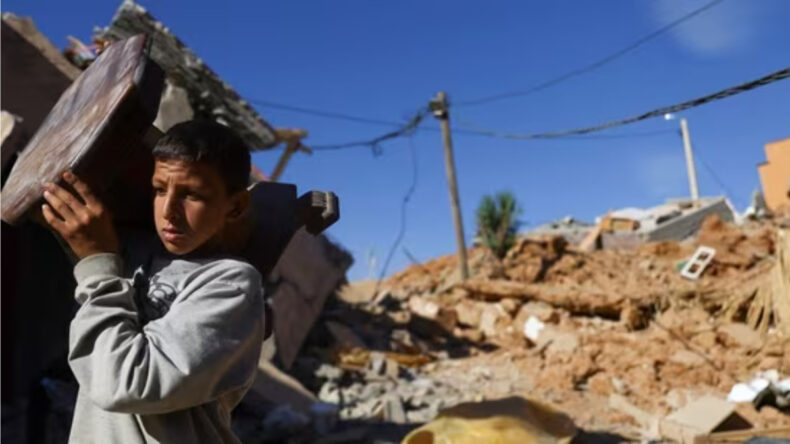Morocco is recovering after the most violent earthquake in almost a century, which has killed 2,497 people and injured 2,476 more, according to the country’s Interior Ministry. The magnitude 6.8 quake struck 47 miles southeast of Marrakesh, wreaking havoc over the High Atlas Mountains. International aid from Spain, the United Arab Emirates, Qatar, the United Kingdom, and others has been welcomed as the country deals with the fallout from this calamitous occurrence.

Morocco: Key Developments
According to the United States Geological Survey (USGS), this earthquake is the greatest to impact the region in well than a century, with no incidents of this magnitude recorded since 1900. The shallow nature of the quake, which struck at a depth of around 11 miles, contributed to its catastrophic impact. According to the United Nations Office for the Coordination of Humanitarian Affairs, about 300,000 people in Marrakesh and its vicinity have been affected.
France, Morocco’s former colonial master, reported at least four dead and 15 injuries among its residents. French Foreign Minister Catherine Colonna has donated 5 million euros ($5.4 million) to assist local non-profit organisations in their search and rescue efforts.
While Americans were hurt, no U.S. citizens were killed, according to the State Department. US Secretary of State Antony Blinken has stated willingness to assist, pending word from the Moroccan government on how the US can help.
From the Ground
Morocco’s hardest-hit districts are among the poorest, lacking basic necessities like as electricity and running water. The lack of state assistance exacerbates the difficulties experienced by these communities, which are still dealing with the repercussions of the earthquake.
Buildings are still collapsing, adding to the catastrophe. In Amizmiz, a town severely damaged by the earthquake, survivors’ belongings could be spotted among the rubble: blankets, bags, carpets, and a mattress bearing the weight of a collapsed second-floor ceiling. The majority of residents have fled to higher elevation, where they may pitch tents on flat, dry soil.
Survivors in Marrakesh described hurried evacuations as walls collapsed around them. As thousands fled, social media images showed the city’s greatest minaret shaking alarmingly. Residents crossed dark, narrow alleyways while covering their lips from dusty air in the lack of electricity.
Working at a medical centre near the epicentre, Dr. Yaqoubi Abdelhadi reported a steady condition but remained on high alert for any incoming patients from outlying locations. Aid workers from the Red Cross and Red Crescent hurried to give medical care and transportation to people in need.
Global Impact
In the aftermath of this calamity, the international community has banded together to support Morocco. France, the United Kingdom, Germany, India, China, Austria, and earthquake-ravaged Turkey have all sent assistance. Despite its long-standing rivalry with Morocco over Western Sahara, Algeria volunteered to reopen its airspace to humanitarian and medical evacuations.
The United States Embassy in Rabat issued a warning, citing limited hospital capacity in large towns like as Marrakesh and expressing fear that hospitals in the hardest-hit areas may soon become overburdened.
Stories of perseverance and tragedy emerge among the damage. Said Afouzar’s family, for example, went through a terrifying ordeal. Afouzar dashed home after the earthquake to save his wife and two children. As he grabbed for the doorknob, the house fell. Afouzar, injured but resolute, delved through the wreckage with the assistance of neighbours. They were successful in rescuing his wife, but it was too late for his children.
Morocco faces a difficult road to rehabilitation as it mourns its losses and faces the obstacles of rebuilding. The outpouring of support from the international community exemplifies global solidarity in times of disaster. As rescue and relief efforts continue, the people of Morocco remain resilient, seeking solace and strength in unity in the face of this devastating earthquake.













